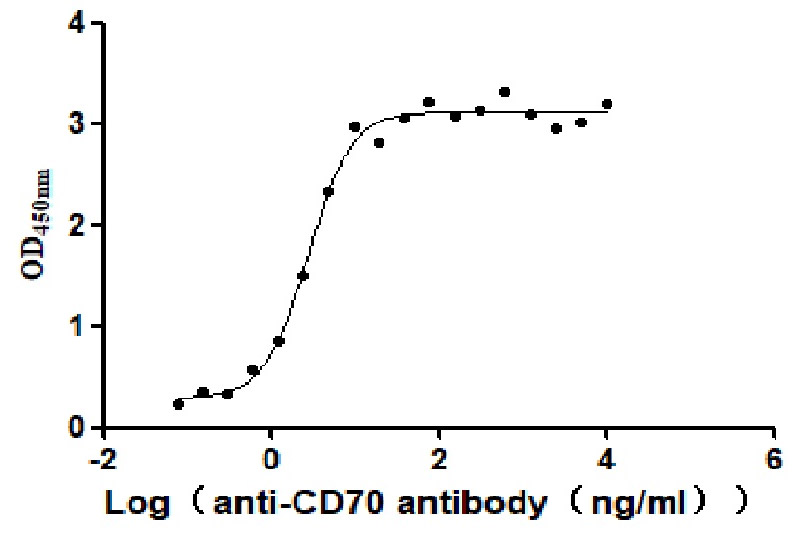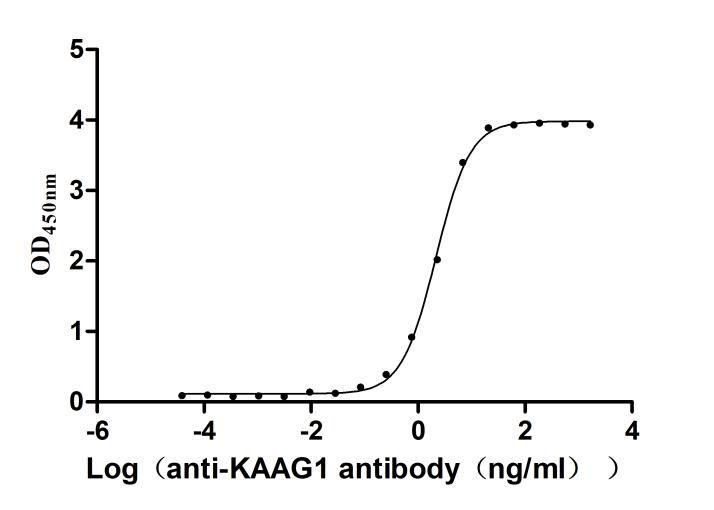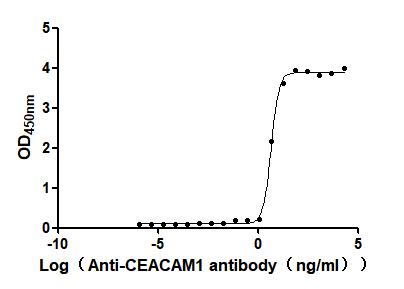Recombinant Human Tumor necrosis factor alpha-induced protein 3 (TNFAIP3)
-
货号:CSB-YP023958HU
-
规格:
-
来源:Yeast
-
其他:
-
货号:CSB-EP023958HU
-
规格:
-
来源:E.coli
-
其他:
-
货号:CSB-EP023958HU-B
-
规格:
-
来源:E.coli
-
共轭:Avi-tag Biotinylated
E. coli biotin ligase (BirA) is highly specific in covalently attaching biotin to the 15 amino acid AviTag peptide. This recombinant protein was biotinylated in vivo by AviTag-BirA technology, which method is BriA catalyzes amide linkage between the biotin and the specific lysine of the AviTag.
-
其他:
-
货号:CSB-BP023958HU
-
规格:
-
来源:Baculovirus
-
其他:
-
货号:CSB-MP023958HU
-
规格:
-
来源:Mammalian cell
-
其他:
产品详情
-
纯度:>85% (SDS-PAGE)
-
基因名:
-
Uniprot No.:
-
别名:A20; AISBL; MGC104522; MGC138687; MGC138688; OTU domain containing protein 7C; OTU domain-containing protein 7C; OTUD7C; Putative DNA binding protein A20; Putative DNA-binding protein A20; TNAP3_HUMAN; TNF alpha-induced protein 3; TNFA1P2; TNFAIP 3; TNFAIP3 (A20); TNFAIP3; Tumor necrosis factor alpha induced protein 3; Tumor necrosis factor alpha-induced protein 3; Tumor necrosis factor induced protein 3; Tumor necrosis factor inducible protein A20; tumor necrosis factor, alpha-induced protein 3; Zinc finger protein A20
-
种属:Homo sapiens (Human)
-
蛋白长度:Full Length of Mature Protein
-
表达区域:2-790
-
氨基酸序列AEQVLPQAL YLSNMRKAVK IRERTPEDIF KPTNGIIHHF KTMHRYTLEM FRTCQFCPQF REIIHKALID RNIQATLESQ KKLNWCREVR KLVALKTNGD GNCLMHATSQ YMWGVQDTDL VLRKALFSTL KETDTRNFKF RWQLESLKSQ EFVETGLCYD TRNWNDEWDN LIKMASTDTP MARSGLQYNS LEEIHIFVLC NILRRPIIVI SDKMLRSLES GSNFAPLKVG GIYLPLHWPA QECYRYPIVL GYDSHHFVPL VTLKDSGPEI RAVPLVNRDR GRFEDLKVHF LTDPENEMKE KLLKEYLMVI EIPVQGWDHG TTHLINAAKL DEANLPKEIN LVDDYFELVQ HEYKKWQENS EQGRREGHAQ NPMEPSVPQL SLMDVKCETP NCPFFMSVNT QPLCHECSER RQKNQNKLPK LNSKPGPEGL PGMALGASRG EAYEPLAWNP EESTGGPHSA PPTAPSPFLF SETTAMKCRS PGCPFTLNVQ HNGFCERCHN ARQLHASHAP DHTRHLDPGK CQACLQDVTR TFNGICSTCF KRTTAEASSS LSTSLPPSCH QRSKSDPSRL VRSPSPHSCH RAGNDAPAGC LSQAARTPGD RTGTSKCRKA GCVYFGTPEN KGFCTLCFIE YRENKHFAAA SGKVSPTASR FQNTIPCLGR ECGTLGSTMF EGYCQKCFIE AQNQRFHEAK RTEEQLRSSQ RRDVPRTTQS TSRPKCARAS CKNILACRSE ELCMECQHPN QRMGPGAHRG EPAPEDPPKQ RCRAPACDHF GNAKCNGYCN ECFQFKQMYG
-
蛋白标签:Tag type will be determined during the manufacturing process.
The tag type will be determined during production process. If you have specified tag type, please tell us and we will develop the specified tag preferentially. -
产品提供形式:Lyophilized powder
Note: We will preferentially ship the format that we have in stock, however, if you have any special requirement for the format, please remark your requirement when placing the order, we will prepare according to your demand. -
复溶:We recommend that this vial be briefly centrifuged prior to opening to bring the contents to the bottom. Please reconstitute protein in deionized sterile water to a concentration of 0.1-1.0 mg/mL.We recommend to add 5-50% of glycerol (final concentration) and aliquot for long-term storage at -20℃/-80℃. Our default final concentration of glycerol is 50%. Customers could use it as reference.
-
储存条件:Store at -20°C/-80°C upon receipt, aliquoting is necessary for mutiple use. Avoid repeated freeze-thaw cycles.
-
保质期:The shelf life is related to many factors, storage state, buffer ingredients, storage temperature and the stability of the protein itself.
Generally, the shelf life of liquid form is 6 months at -20°C/-80°C. The shelf life of lyophilized form is 12 months at -20°C/-80°C. -
货期:Delivery time may differ from different purchasing way or location, please kindly consult your local distributors for specific delivery time.Note: All of our proteins are default shipped with normal blue ice packs, if you request to ship with dry ice, please communicate with us in advance and extra fees will be charged.
-
注意事项:Repeated freezing and thawing is not recommended. Store working aliquots at 4°C for up to one week.
-
Datasheet :Please contact us to get it.
相关产品
靶点详情
-
功能:Ubiquitin-editing enzyme that contains both ubiquitin ligase and deubiquitinase activities. Involved in immune and inflammatory responses signaled by cytokines, such as TNF-alpha and IL-1 beta, or pathogens via Toll-like receptors (TLRs) through terminating NF-kappa-B activity. Essential component of a ubiquitin-editing protein complex, comprising also RNF11, ITCH and TAX1BP1, that ensures the transient nature of inflammatory signaling pathways. In cooperation with TAX1BP1 promotes disassembly of E2-E3 ubiquitin protein ligase complexes in IL-1R and TNFR-1 pathways; affected are at least E3 ligases TRAF6, TRAF2 and BIRC2, and E2 ubiquitin-conjugating enzymes UBE2N and UBE2D3. In cooperation with TAX1BP1 promotes ubiquitination of UBE2N and proteasomal degradation of UBE2N and UBE2D3. Upon TNF stimulation, deubiquitinates 'Lys-63'-polyubiquitin chains on RIPK1 and catalyzes the formation of 'Lys-48'-polyubiquitin chains. This leads to RIPK1 proteasomal degradation and consequently termination of the TNF- or LPS-mediated activation of NF-kappa-B. Deubiquitinates TRAF6 probably acting on 'Lys-63'-linked polyubiquitin. Upon T-cell receptor (TCR)-mediated T-cell activation, deubiquitinates 'Lys-63'-polyubiquitin chains on MALT1 thereby mediating disassociation of the CBM (CARD11:BCL10:MALT1) and IKK complexes and preventing sustained IKK activation. Deubiquitinates NEMO/IKBKG; the function is facilitated by TNIP1 and leads to inhibition of NF-kappa-B activation. Upon stimulation by bacterial peptidoglycans, probably deubiquitinates RIPK2. Can also inhibit I-kappa-B-kinase (IKK) through a non-catalytic mechanism which involves polyubiquitin; polyubiquitin promotes association with IKBKG and prevents IKK MAP3K7-mediated phosphorylation. Targets TRAF2 for lysosomal degradation. In vitro able to deubiquitinate 'Lys-11'-, 'Lys-48'- and 'Lys-63' polyubiquitin chains. Inhibitor of programmed cell death. Has a role in the function of the lymphoid system. Required for LPS-induced production of proinflammatory cytokines and IFN beta in LPS-tolerized macrophages.
-
基因功能参考文献:
- Analysis of postmortem brain tissue and CSF of multiple sclerosis (MS) patients revealed that expression of A20/TNFAIP3, as well as the expression levels of IL-1beta and NLRP3 were significantly increased in MS plaques. PMID: 29789522
- LIFR-AS1 serves as a competitive endogenous RNA for miR-29a to inhibit its expression and up-regulate downstream target TNFAIP3 expression, finally modulating the resistance of colorectal cancer to pohotodynamic therapy. PMID: 29807108
- Study demonstrates evidence of the constitutive expression of A20 in macrophages, its role in supporting the differentiation program, and the functional consequences of the zinc finger domains thereof. PMID: 28771803
- A20 dimers bind linear ubiquitin to stabilize the Ripoptosome and potentiate its apoptosis-inducing activity. PMID: 30209212
- At least in the subcutaneous fat of humans and mice, the levels of PGC-1a decrease during obesity, while its physical association with A20 increases. PMID: 29678181
- Results suggest a clinicopathologic implication of A20 in progression of NKTL. PMID: 29380463
- Studied effect of temperature on gene expression regulation by NF-kappabeta on TNF alpha induced protein 3 (A20) transcription. PMID: 29760065
- TNFAIP3 abnormality was less prevalent among intestinal diffuse large B-cell lymphomas with some discordancy between gene deletion and protein expression. PMID: 29463935
- antidepressant treatment exerts anti-inflammatory effects, at least in part through increased expression of the TNFAIP3 gene PMID: 27640899
- A20 regulates canonical wnt-signaling through an interaction with RIPK4 PMID: 29718933
- these results suggested that in human colorectal cancer cells, A20 may function to inhibit cancer progression via down-regulation of TNFalpha-induced chemokine production by suppression of ERK signaling PMID: 29175508
- Low A20 expression is associated with HIV disease. PMID: 29505600
- A20 overexpression in vivo significantly reduced renal injury as demonstrated by the improved levels of Scr and BUN and the reduction in histological damage. PMID: 29067462
- the risk allele for the TNFAIP3 rs2230926 polymorphism was associated with systemic lupus erythematosus susceptibility. PMID: 29783072
- It was concluded that the A20 protein in macrophages modulates lung injury induced by LPS. The overexpression of A20 in macrophages may be involved in modulating macrophage polarization. PMID: 28791391
- TNF phase III signalling displays ongoing TNFR1/NF-kappa B activation in monocytic cells. High- and low-sensitive genes are induced including differentially regulated A20. A20 strictly controls this signalling in an IKK- and partially RIP-dependent manner. The A20-mediated control mechanisms are supported by ABIN1 and CYLD. PMID: 28629782
- A20 is a negative regulator of inflammation in human myometrium and foetal membranes. PMID: 28911210
- The tandem polymorphisms (rs148314165, rs200820567), deletion T followed by a T to A transversion and collectively referred to as TT > A variant of TNFAIP3 may be associated with the susceptibility of chronic hepatitis B virus infection but not the clinical disease. PMID: 28784141
- elevated A20 expression is involved in the severity of chronic hepatitis B PMID: 28473659
- The results of this study confirmed that the A20 expression is reduced in whole blood of Multiple Sclerosis patients as compared to healthy control. PMID: 28337659
- C/EBP beta LAP isoform expression was increased and LIP/TNFAIP3/TNIP1 expression was decreased in systemic lupus erythematosus (SLE) patients. LAP expression was positively correlated with SLE disease activity; TNFAIP3 and TNIP1 expression was negatively correlated with SLE disease activity. PMID: 27659348
- A20 may have a role in the progression of chronic HBV infection PMID: 27634895
- A20 overexpression inhibits hepatic stellate cell activation, which could be the mechanism for high A20 expression protected livers from fibrosis. PMID: 28251449
- The data demonstrate that miR-125b regulates nasopharyngeal carcinoma cell proliferation and apoptosis by targeting A20/NF-kappaB signaling pathway, and miR-125b acts as oncogene, whereas A20 functions as tumor suppressor. PMID: 28569771
- we demonstrate that a pathological reduction in TNFAIP3 levels induced NF-kappaB/SMAD7 pathway activation, causing a deficiency in MSCs in ITP patients. The ability of ITP-MSCs to support megakaryocytic differentiation and thrombopoiesis of CD34(+) cells was impaired. PMID: 29327472
- miR-125b regulates differentiation and reprogramming of T cell glucose metabolism via targeting A20 in T cell acute lymphoblastic leukemia. PMID: 27637078
- Review/Meta-analysis: TNFAIP3 gene rs10499194, rs13207033 polymorphisms decrease the risk of rheumatoid arthritis, especially among Caucasian populations. PMID: 27779104
- In vitro deletion of A20 in B cells compromised the expression of IL10. PMID: 27825134
- Low A20 expression is associated with hepatocellular carcinoma. PMID: 26909601
- The results suggest that TNFAIP3 polymorphisms (rs2230926, rs5029937, rs5029939, and rs3757173) are associated with susceptibility to systemic lupus erythematosus. (Meta-analysis) PMID: 27726311
- Hepatitis C virus core protein ligates gC1qR to induce A20 expression in macrophages via P38, JNK and NF-kappaB signaling pathways, which leads to a low-grade chronic inflammation during HCV infection. PMID: 27183919
- Results show that TNFAIP3 expression is regulated by miR-19b through targeting its 3'-UTR which contributes to the radioresistance of nasopharyngeal carcinoma and consequently activating the NF-kappaB pathway. PMID: 27919278
- demonstrates that TNFAIP3 gene polymorphisms (rs2230926 and rs5029937) are associated with the increased risk of rheumatoid arthritis. [META-ANALYSIS] PMID: 28888761
- CHN1 and TNFAIP3 are candidate biomarkers for esophageal squamous cell carcinomas PMID: 27072986
- These results identify the ubiquitin-editing enzyme A20 as a novel endogenous mechanism for negative regulation of fibrotic response intensity PMID: 27716397
- Our data propose an additional novel mechanism to explain the known NF-kappaB inhibitory effects of A20: by affecting p105 ubiquitination and subsequently its degradation and limited processing. PMID: 28923245
- A20 promotes metastasis of aggressive basal-like breast cancers through multi-monoubiquitylation of Snail1. PMID: 28892081
- Low TNFAIP3 expression is associated with colitis-associated colorectal cancer. PMID: 27991929
- The miR-17-92 is a critical contributor to CML leukemogenesis via targeting A20 and activation of NF-kappaB signaling. PMID: 28461114
- IM could upregulate A20 protein to inhibit the activation of NF-kappaB pathway in Jurkat T cells, which was independent of the ABIN1 protein. PMID: 28502291
- this meta-analysis confirms that TNFAIP3 gene polymorphisms may play important roles in the pathogenesis of Rheumatoid arthritis PMID: 28199970
- Report a significant association between the biased usage of IGHV4-34 (binds to the carbohydrate I/i antigens) and inactivating mutation of TNFAIP3 [encoding a global negative regulator of the canonical nuclear factor-kappaB (NF-kappaB) pathway] in ocular adnexal MALT lymphomas. PMID: 28682481
- reduced expression confers susceptibility to psoriasis PMID: 28658319
- Haploinsufficiency of TNFAIP3 (A20) by a germline heterozygous mutation leads to the autoimmune lymphoproliferative syndrome (ALPS) phenotype. PMID: 27845235
- These results suggested that A20 is involved in regulating intracerebral hemorrhage-induced inflammatory injury in both the central and peripheral system PMID: 27986908
- In targeted sequencing, a disruptive mutation of TNFAIP3 was the most common alteration (54%), followed by mutations of TBL1XR1 (18%) and cAMP response element binding proteins (CREBBP) (17%). PMID: 28152507
- the DNA fragment containing the associated SNPs interacts through chromatin looping not only with TNFAIP3, but also with IL20RA, located 680 kb upstream. PMID: 27799070
- The findings suggest that TNFAIP3 protein may be an independent prognostic marker for poor survival, and a promising target for esophageal squamous cell carcinoma therapy. PMID: 28197630
- Study demonstrates that the rs7749323 in the TNFAIP3 gene is strongly associated with the late onset myasthenia gravis(with positive AChR Ab but without thymoma). PMID: 28514294
- Influenza a virus NS1 has a role in inducing A20 contributes to viral replication by suppressing interferon-induced antiviral response PMID: 27914808
显示更多
收起更多
-
相关疾病:Autoinflammatory syndrome, familial, Behcet-like (AISBL)
-
亚细胞定位:Cytoplasm. Nucleus. Lysosome.; [A20p50]: Cytoplasm.
-
蛋白家族:Peptidase C64 family
-
数据库链接:
HGNC: 11896
OMIM: 191163
KEGG: hsa:7128
STRING: 9606.ENSP00000237289
UniGene: Hs.211600
Most popular with customers
-
Recombinant Human CD70 antigen (CD70), partial (Active)
Express system: Mammalian cell
Species: Homo sapiens (Human)
-
Recombinant Human Kidney-associated antigen 1(KAAG1) (Active)
Express system: E.coli
Species: Homo sapiens (Human)
-
Express system: Mammalian cell
Species: Homo sapiens (Human)















